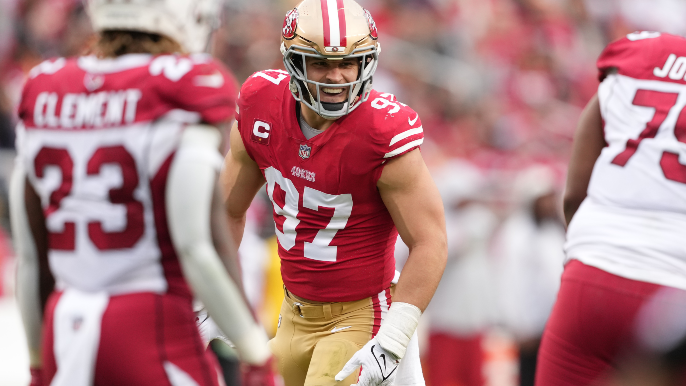
Nick Bosa has made the 49ers uncomfortable.
The organization thought an extension would be done by now. But with nine days left before the season opener, he remains unsigned.
Kyle Shanahan admitted this week that it’s possible Nick Bosa is not signed by Week 1.
The negotiations are lingering because Bosa’s situation is unique. While NFL teams use top-of-market contracts within position groups to know what the framework is for a deal, Bosa is in his own market, at a position that is two years overdue for a major reset.
It’s not T.J. Watt or Joey Bosa that Nick Bosa’s contract should be based on. It should be Jared Goff’s, with Aaron Donald as the floor.
Whereas the 49ers have had success in getting top-, or near top-of-the-market deals done with the likes of Trent Williams (worth exactly $10,000 per year more than David Bakhtiari), Fred Warner, George Kittle and Deebo Samuel, Bosa is in a unique situation.
When those players were signed, there were usually recent deals of players at the same position in a similar age range to base them off.
Kittle was unique, and re-set the tight end market. But he didn’t blow over the market, the top of which still slots the best tight ends in the same range as good, but not elite veteran wide receivers.
Kittle exceeded Travis Kelce in average annual value (AAV) by less than $700,000 per year. He was guaranteed $40 million, which was just surpassed by T.J. Hockenson ($42.5 million) and his average annual value has now been surpassed by both Hockenson and Darren Waller.
It was a lot of money, but it’s a deal which has outs. Almost all of the 49ers’ big contracts are structured in a way that allows them some wiggle room down the line.
San Francisco didn’t have an immense amount of leverage in those situations, but the numbers were a bit easier. That said, they took time, and went late into the summer.
This go around, with Bosa, their leverage is almost nonexistent.
He is unlike anyone else, for a few reasons:
- He is the best defensive player in the league, in his prime at age 25, coming off a Defensive Player of the Year season.
- He comes from the same family as Joey Bosa — who, if you’ll remember, had a 31-day holdout in his rookie year over offset language and was the last rookie to sign his contract. The Bosas are tough negotiators.
- He plays at the most valuable position in the NFL that’s not quarterback, and which hasn’t had a major jump in the top contract in more than two years.
All of these factors are crucial.
As far as leverage goes, all the 49ers can appeal to is Bosa’s desire to play football on a team competing for an NFC Championship and hope that their defensive line looks great without him.
It’s hard imagine how the 49ers would gain any leverage by going into the season without Bosa, unless Drake Jackson — who missed a ton of time in camp and fell off at the end of last season — looks outrageously good along with Clelin Ferrell.
But the idea that Bosa is losing sleep over a few weeks off at the start of the season — when the 49ers have a tendency to start slow, anyway — seems dubious.
You don’t test the Bosas in this arena. They were born to play defensive end and are as stubborn as anyone in the league when it comes to contract negotiations. Bosa knows his value, and rightfully deserves to cash in.
There are three defensive contracts that are likely being used in negotiations, and Bosa’s numbers should exceed all of them:
- The highest defensive end contract right now is T.J. Watt, who signed a four-year deal worth just over $28 million per year in 2021, with $80 million fully guaranteed, when he was 27.
- The year before, Joey Bosa signed a five-year deal worth $27 million, with $102 million guaranteed and $78 million fully guaranteed, when he was 25.
- The current highest-paid defensive player in the NFL is Aaron Donald, who has an average salary of $31.67 million per year, $65 million guaranteed and $46.5 million fully guaranteed over three seasons, on a deal signed last year, when he was 31 — six years older than Nick Bosa is now.
The defensive end market is due for a substantial reset. Even if you took Joey Bosa’s contract and increased it based on inflation (per the Bureau of Labor’s own calculator) from when he signed in July 2020 to July 2023, that would give you an average annual value of $33.03 million and $94.39 million in fully guaranteed money.
But of course, the salary cap doesn’t rise the same way inflation does. Much of that is due to the COVID-19 season in 2021, when the cap dropped by $15.7 million. But the cap has still grown from $198.2 million in 2020 to $224.8 million this year, which is 13.42 percent.
If you use 13.42 percent that figure on Joey Bosa’s contract, it clocks in at $31.76 million per year, with $88.92 million fully guaranteed.
That’s without even comparing the two brothers.
Joey Bosa’s best season had 12.5 sacks. He had 11.5 sacks the year before signing that extension.
Nick Bosa had 19.5 sacks last year and is unquestionably worth more than his brother. While he’s had ACL injuries, he’s remained on the field more than Joey Bosa. Three years have passed since his brother got his deal. His and Watt’s are already way out of date.
The most useful contract framework for Bosa isn’t any of those three players, though their numbers provide a floor.
It’s Jared Goff’s deal from 2021. Per OverTheCap:

Goff got a four-year, $134 million deal from the Rams with a then-league record of more than $110 million guaranteed, along with $57 million fully guaranteed for an average annual salary of $33.5 million, signed when he was 27. Add at least another year onto that contract, and it’s not far-fetched to see Bosa getting something similar.
As it stands, Goff is the 15th highest-paid quarterback and player in the league.
Donald, at $31.67 million per year, is the 16th highest-paid player in the league this season (Kirk Cousins is 14th at $35 million per year).
Bosa should be somewhere between Donald and Goff, and possibly even at Goff’s level.
Yes, $33.5 million is incredibly steep for a non-quarterback. But it’s effectively $2 million more per year than his brother’s 2020 extension would be worth today given cap growth, and Nick Bosa is a more productive player than Joey Bosa.
In 2020, Patrick Mahomes’ $45 million AAV led the league. Joey Bosa got a deal worth $18 million less per year.
Even if Nick Bosa got Goff’s $33.5 million per year, it would be $19 million less per year than Justin Herbert’s new league-leading AAV of $52.5 million per year.
In that context, it’s not an outrageous valuation for the second-most valuable position on the field.
It should also be mentioned that the most significant numbers on contracts are guarantees, and that average annual value only matters if a player is likely to get paid most or all of their contract.
Tyreek Hill, for example, has what is essentially a fake final year on his deal that slates him a $43.9 million base salary that he’ll never see.
But players like Donald, Watt, the Bosas, and premium quarterbacks tend to see most of that money:
- Goff was guaranteed 61.9 percent of his deal and fully guaranteed 22.4 percent
- Donald was guaranteed 68.4 percent of his deal and fully guaranteed 48.9 percent
- Watt was fully guaranteed 61.9 percent of his deal
- Joey Bosa was guaranteed 64.9 percent of his contract and fully guaranteed 47.1 percent
Nick Bosa will be guaranteed a majority of his contract, potentially around $100 million fully guaranteed. That means he is extremely likely to actually get paid the total of his average annual value over the course of his deal.
Regardless of exactly where the average per year lands, there’s no question the number will have to be more than $30 million. There shouldn’t even be much question over whether to pay him more annually than Aaron Donald.
The math supports Bosa. The production does too. He and his agent, Brian Ayrault, have the leverage here.
But if the 49ers are debating whether to cross Donald’s threshold, and trying to negotiate within Watt or Joey Bosa’s outdated framework? Well, it wouldn’t be a surprise to see this thing take a while longer.

